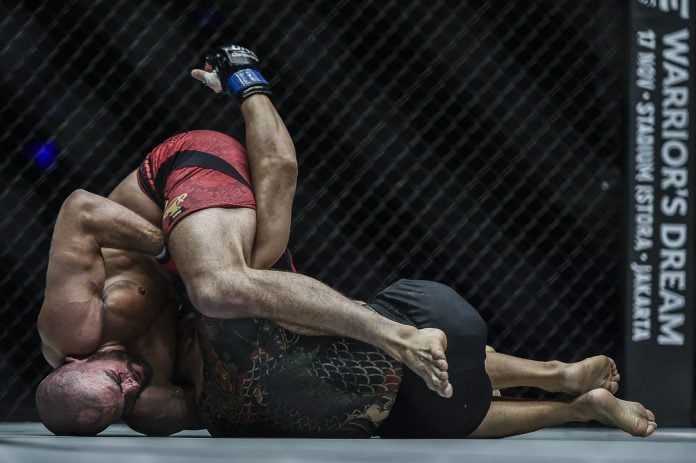
Out of all the front headlock chokes available, none is more powerful than the high elbow guillotine. The guillotine choke is the first choice of a submission from there anyway. The old school choice is the arm-in guillotine choke. As effective as it can be, it is still an air choke, which means it’s less reliable than blood chokes. There’s also the “regular” guillotine, which is indeed a blood choke. However, this one is really easy to defend, so it is a medium-percentage submission at best. Which is where Marcelo came in, paving the way for the high elbow guillotine through his modification named the Marcelotine.
When the Marcelotine hit the stage, people suddenly got a high-percentage guillotine option that worked as a blood choke. Sound perfect right? The only issue with Marcelo Garcia is that he is Marcelo Garcia. He is built in a certain way and has physical attributes that not many of the grappling population share. While no one can dispute the effectiveness of his techniques, they’re hard to work for everyone. This is where the modern day BJJ guru swept in to clear up all the confusion. John Danaher is the man who gave the high elbow guillotine it’s the latest twist. Now, the move is available to everyone regardless of flexibility or experience level. And in this article, we’ll get over all the juicy details.
John Danaher has been on a DVD recording spree lately. So far, his DVD collection has four distinct volumes, one of which is the ultimate guide to Guillotine chokes. “Enter The System: Front Headlocks” is an 8 part DVD set that covers everything there is about the front headlock position. Setups, entries, submissions, and transitions are all explained in great detail by the master himself.
Air Vs. Blood Guillotine Chokes
BJJ chokes usually work in one of the effective strangling ways. In terms of putting someone to sleep, the goal is the same – cut off the oxygen supply. The two main avenues of doing this are by direct pressure on the airways, or by blocking the arteries that supply the brain. The first variety is known as artichokes, while those that target the carotid arteries are blood chokes. Guillotines can work in both of these ways.
The arm in guillotine usually works as an air choke, due to the positioning of the wrist and forearm. Having an arm included in the loop means your arms are stretched to the maximum. This is particularly obvious against larger opponents. It also means that there’s no way to compress the arteries. Instead, the focus is on blocking the trachea, right below the larynx. This means that the choke is particularly nasty as it has a pain component in addition to oxygen deprivation.
The regular guillotine is a curious one. It works mostly as a blood choke, but it can also double as an air choke. It all depends on how deep the wrist is and which part of your hand/forearm you’re using to choke. For the regular guillotine, there’s less space, because the arm is not included. This means that it is a tighter choke, but it is quite easy to defend. IF an opponent gets a grip on your palms, plus a grip on the elbow of one of the arms it’s all done and dusted. Which is where the high elbow guillotine comes in, as a pure and unstoppable blood choke.
High Elbow Guillotine
What John Danaher brought as a change in the high elbow guillotine was specific and precise positioning. This includes positioning of the wrists and palms, the elbows and the legs. Moreover, it includes very specific body positioning to remove all the flexibility obstacles that the Marcelotine had.
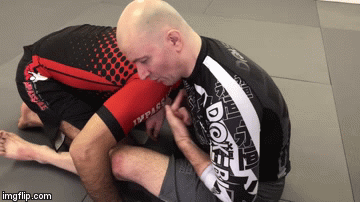
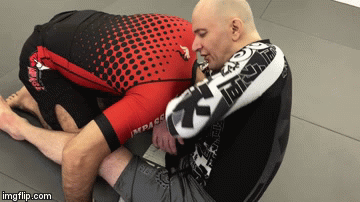
Finally, your legs. There are two main positions that you can have your legs in. One is with the bottom leg in half guard, while the other has it as a shield across the opponent’s hips. What’s really important is the top leg, which has only one position – across the back. Remember to point your toes straight, like a ballerina’s foot to ensure your leg stays in place. This is a crucial detail to maintain broken posture.
Front Headlock Setup
The best position to get guillotine choke, in general, is the front headlock position. For the high elbow guillotine, there’s actually no better setups. The first thing to have in mind here is grip fighting. Until you get to the centerline shift, you absolutely have to be in command of the grip fight. This means you need a solid and unmovable chin strap grip on the opponent’s jaw. Furthermore, you need to make sure you have control over the opposite side elbow. Triceps control with an overgrip is the best here, although an undergrip can also do the job. Make sure your opponent doesn’t have access to your chin strap arm before you go fro the centerline shift.
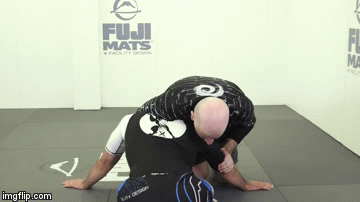
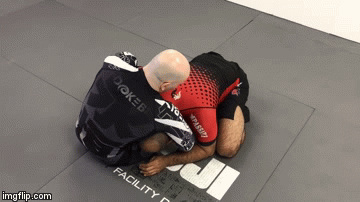


![Darce Choke Encyclopedia – Origins, Mechanics and Variations [2025] BJJ, choke, Brabo, BJJ Darce Choke, D'arce Choke, Darce BJJ Choke](https://bjj-world.com/wp-content/uploads/2017/11/JungPoirierLeeYahoo-218x150.jpg)






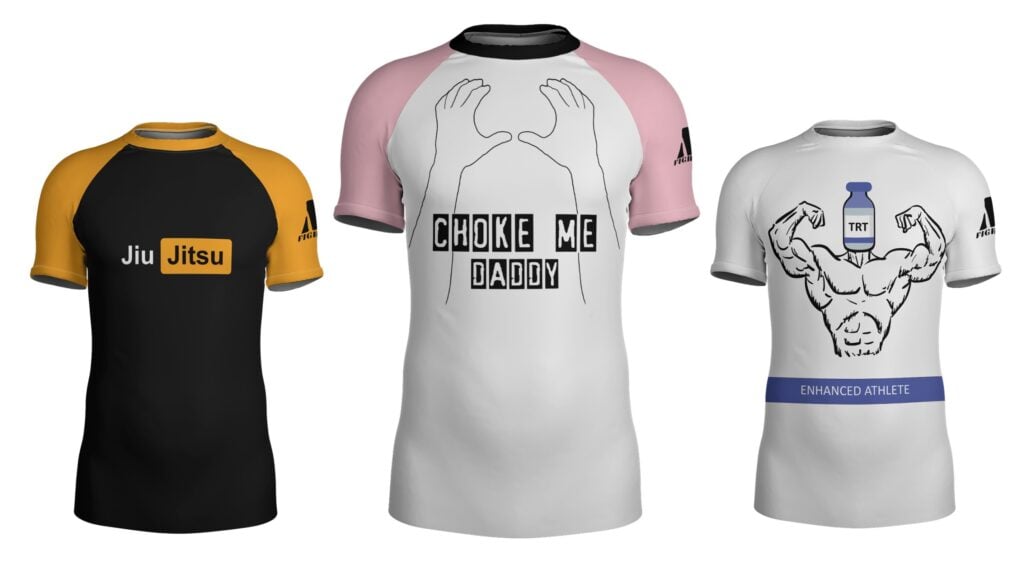


![Countering with Crab Ride Anthony Budion DVD Review [2025] Countering with Crab Ride Anthony Budion DVD Review](https://bjj-world.com/wp-content/uploads/2025/03/countering-with-crab-ride-anthony-budion-dvd-review-218x150.png)
![Closet Closed Guard Craig Jones DVD Review [2025] Closet Closed Guard Craig Jones DVD Review](https://bjj-world.com/wp-content/uploads/2025/03/closet-closed-guard-craig-jones-dvd-review-218x150.png)
![Xanadu Back Takes Levi Jones-Leary DVD Review [2025] Xanadu Back Takes Levi Jones-Leary DVD Review](https://bjj-world.com/wp-content/uploads/2025/03/xanadu-back-takes-levi-jones-leary-dvd-review-218x150.png)

![No-Gi Grapplers Guide To Front Headlock Joel Bane DVD Review [2025] No-Gi Grapplers Guide To Front Headlock Joel Bane DVD Review](https://bjj-world.com/wp-content/uploads/2025/03/no-gi-front-headlock-joel-bane-dvd-review-218x150.png)

![Assassin Choke Baret Yoshida DVD Review [2024] Assassin Choke Baret Yoshida DVD Review](https://bjj-world.com/wp-content/uploads/2024/10/assassin-choke-baret-yoshida-dvd-review-100x70.png)


![Double Sleeve Guard Jon Thomas BJJ DVD Review [2024] Double Sleeve Guard Jon Thomas BJJ DVD Review](https://bjj-world.com/wp-content/uploads/2024/10/double-sleeve-guard-jon-thomas-bjj-dvd-review-100x70.png)

![Crossing and Spinning Steps To Attack Israel Hernandez DVD Review [2024] Crossing and Spinning Steps To Attack Israel Hernandez DVD Review](https://bjj-world.com/wp-content/uploads/2024/09/spinning-steps-to-attack-israel-hernandez-dvd-review-100x70.png)

![Mastering Control From Top Position Trent Hidlay DVD Review [2024] Mastering Control From Top Position Trent Hidlay DVD Review](https://bjj-world.com/wp-content/uploads/2024/11/control-from-top-position-trent-hidlay-dvd-review-100x70.png)
![Full Guard Formula James Booth DVD Review [2025] Full Guard Formula James Booth DVD Review](https://bjj-world.com/wp-content/uploads/2025/02/full-guard-formula-james-booth-dvd-review-100x70.png)



![Complete Fundamentals Curriculum Eliot Marshall DVD Review [2025] Complete Fundamentals Curriculum Eliot Marshall DVD Review](https://bjj-world.com/wp-content/uploads/2025/02/fundamentals-curriculum-eliot-marshall-dvd-review-100x70.png)


![The Stack Pass Andre Galvao DVD Review [2025] The Stack Pass Andre Galvao DVD Review](https://bjj-world.com/wp-content/uploads/2025/01/the-stack-pass-andre-galvao-dvd-review-100x70.png)


![EMU Guard 2.0 Benjamin Power DVD Review [2024] EMU Guard 2.0 Benjamin Power DVD Review](https://bjj-world.com/wp-content/uploads/2024/11/emu-guard-2-0-benjamin-power-dvd-review-100x70.png)
![Collar Sleeve Guard Mikey Musumeci DVD Review [2024] Collar Sleeve Guard Mikey Musumeci DVD Review](https://bjj-world.com/wp-content/uploads/2024/12/collar-sleeve-guard-mikey-musumeci-dvd-review-100x70.png)
![Creating Back Exposure Luke Griffith DVD Review [2025] Creating Back Exposure Luke Griffith DVD Review](https://bjj-world.com/wp-content/uploads/2025/01/creating-back-exposure-luke-griffith-dvd-review-100x70.png)
![Dima Murovanni Kill The Collar Tie BJJ Trendsetters DVD Review [2024] Dima Murovanni Kill The Collar Tie BJJ Trendsetters DVD Review](https://bjj-world.com/wp-content/uploads/2024/09/dima-murovanni-kill-the-collar-tie-dvd-review-100x70.png)
![Osoto Gari for Jiu Jitsu Jackson Nagai DVD Review [2024] Osoto Gari for Jiu Jitsu Jackson Nagai DVD Review](https://bjj-world.com/wp-content/uploads/2024/10/osoto-gari-for-jiu-jitsu-jackson-nagai-dvd-review-100x70.png)
![Foot Sweep the World Dainis Nguyen-Huu DVD Review [2024] Foot Sweep the World Dainis Nguyen-Huu DVD Review](https://bjj-world.com/wp-content/uploads/2024/11/foot-sweep-the-world-dainis-nguyen-huu-dvd-review-100x70.png)


![Reverse De La Riva System Mikey Musumeci DVD Review [2024] Reverse De La Riva System Mikey Musumeci DVD Review](https://bjj-world.com/wp-content/uploads/2024/11/reverse-de-la-riva-system-mikey-musumeci-dvd-review-100x70.png)
